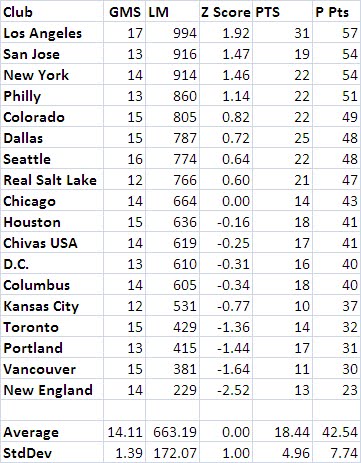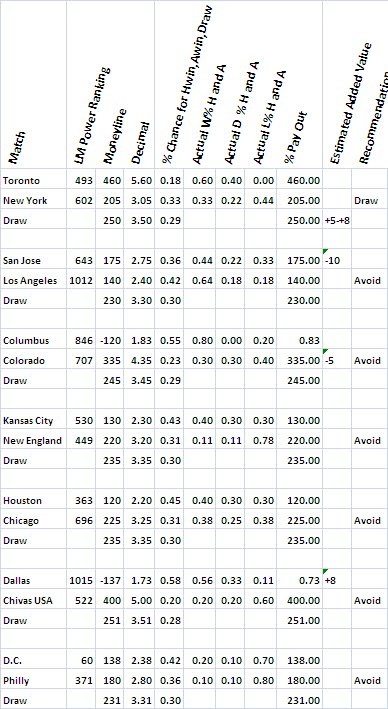By MJD
We've at long last found time to gather the data and crunch the numbers, and although the rankings might raise a few eyebrows, some of the more interesting tidbits can only be found by drilling down a bit deeper into the actual numbers themselves. First things first, however.
The Rankings
The Big Four is no more. This year, according to our metric, it's the big three and then the rest of the crowd. Chelsea, Man U and Arsenal are top of the table, and are all 1.5 or higher in the Z-score for the LM. Below them are Man City, Everton, Newcastle (yes, Newcastle) and Bolton (yes, Bolton). one could throw Spurs in with this group group, but at .12 STDEVs they don't quite fit in with this second tier of teams. We root for Spurs in Europe, and think they are clearly a quality squad, but we also think playing in two major competitions (EPL and Champions League) is taking its toll. Whatever the case, the drop off from the top three suggests that the EPL is really comprised of about five sets of clubs, the elite (Chelsea, Man U, Arsenal), the good (Everton, Newcastle, maybe Bolton [we'll see]), the above average (Spurs, Sunderland, Liverpool), the below average (West Brom, Fulham, Villa, Blackburn, Blackpool, Birmingham, Wigan, Stoke), and the dregs (Wolves and West Ham).
Now, although we obviously love numbers, we're not slaves to them. It's hard to accept Bolton as being better than Spurs. But they're tied in the table, at least on points without considering any tie breakers, and we have them slightly better in our rankings. Bolton is a bit of an odd bird, however, as although they're scoring goals at a respectable clip (above average in virtually every offensive stat we track), they are also a bit leaky (below average in virtually every defensive stat we track). But on the road they've have been doing exceptionally well, drawing or winning a whopping 84% of their away matches. You can't argue with those results. But they've only won 33% of their home matches, below the league average at the moment of 43% and well below the historical average number of home wins which is generally around 50%. Whatever the explanation, Bolton is certainly a solid side, at least through 12 fixtures.
A Bit Deeper
Here are a number of observations from a bit deeper in the data:
Chelsea has only given up a total of 5 Goals Against, which is best in the league. However, they're giving up Shots Against and Shots on Goal Against at a fairly normal rate: 10.92 SHTA/GM and 4.08 SOGA/GM; the league averages right now are 12.2 and 4.26. This means that the percentage of goals scored against them relative to the number SOGs they give up is a very low 10%. The league average right now is 31%, which is around the historical average for the league and world football generally. In other words, the average team in the EPL gives up one goal for every three shots on goal it allows. Chelsea gives up one goal for every TEN shots on goal it allows. The next time someone you know disses either Petr Cech or Chelsea's back four, punch them in the mouth.
You think Arsenal has a goalkeeping problem? Duh. But here's some numbers worth throwing around: Arsenal gives up only 2.58 SOGA/GM. That's the fewest Shots on Goal Against per Game in the league. And they are only giving up .92 GA/GM, which is well below the league average of 1.31. But they're ratio of GA to SOGA is .35 (the league average is .32). In other words, when teams manage to put a shot on goal, it goes in 35% of the time. So even though they give up fewer shots on goal than the rest of the league, which accounts for their low GA/GM, if you do manage to create a chance, your odds of it going in are actually better than average--because their goalies blow.
Incidentally, Arsenal also leads the league in the ratio of G/SOG at 53%. This suggests that they are very efficient and are also good at creating quality chances rather than mere dribblers that roll to the feet of the keeper. Put a true, world-class keeper in the net and they'd be top of the table.
Finally, what ails Spurs? Given the number of Shots and Shots on Goal they've managed to create, their Expected Goals For is 19. The number of goals they've actually scored is a mere 14. In other words, if they scored goals at the league average rate for every chance they managed to create, they would have 5 more goals than they've actually scored--and goals, boys and girls, equal points in the table. This suggests that the number of true quality chances they create is actually quite low compared to other clubs. One culprit? How about Crouch? Yeah, he's nine feet tall, so it's much easier to put the ball on top of his head, but perhaps all those headers aren't nearly as dangerous as Harry Redknapp wants to believe. I'd build a franchise around van der Vaart, who wouldn't? But clearly, Spurs is much less dangerous on the attack--at least in the EPL--than you'd expect. The numbers, and the dearth of points, don't lie.
Thursday, November 11, 2010
Subscribe to:
Posts (Atom)










 The Luchametric is a
The Luchametric is a 

















